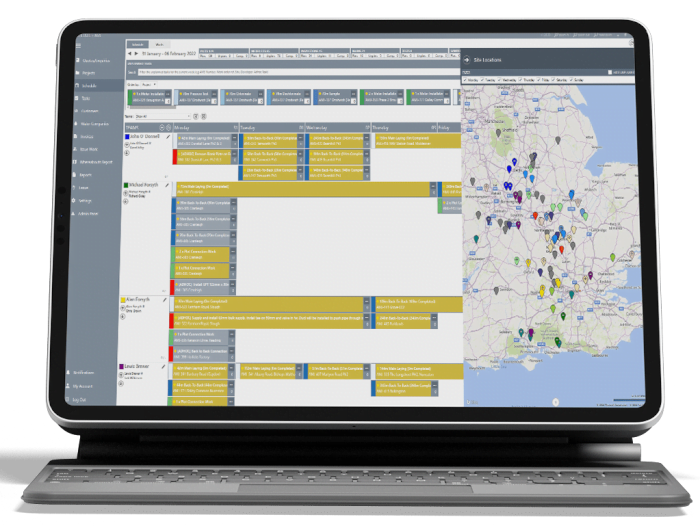ERP Pricing – Introduction
In this blog post, we’ll dive into the details of ERP pricing, with a special focus on custom or bespoke solutions. We’ll break down what factors influence the cost of a custom ERP system and how these costs can vary based on different aspects of your business.
Our goal is to help you grasp the different elements that affect the ERP price, such as development, hosting, data migration, and ongoing support. By understanding these factors, you can plan your budget more effectively and make informed decisions about investing in a custom ERP system. We’ll also compare how costs differ for small, medium, and large businesses, giving you a clearer picture of what to expect.
Whether you’re considering a new ERP system or looking to upgrade an existing one, this guide will provide you with the information you need to ensure that your investment aligns with your business needs and financial goals.
Benefits of ERP Systems
ERP systems streamline operations by automating routine tasks and simplifying workflows, which saves time and effort. This automation ensures that daily processes are handled more efficiently, freeing up valuable resources within the business. Moreover, storing all business data in one place enhances data accuracy and keeps information up-to-date. With accurate and current data, businesses can make better decisions and avoid costly errors.
In addition to improving data accuracy, ERP systems offer powerful reporting tools that provide valuable insights into business performance. These tools help organisations understand their operations more clearly and make informed strategic decisions. By reducing manual work through automation and integrating various functions, ERP systems boost overall efficiency. As a result, staff can concentrate on more progressive tasks, further driving productivity and growth within the company.
Businesses That Use ERP Systems
ERP systems benefit a wide range of businesses, from small startups to large corporations. As companies grow, managing various functions with separate systems can become increasingly difficult. An ERP system helps by bringing these processes together into a single, streamlined system, making it easier to manage and oversee operations. Additionally, businesses with complex operations or multiple departments find ERP systems especially useful. By integrating all these different functions into one platform, ERP systems offer a unified view of their operations, which simplifies management and improves efficiency. Consequently, whether you’re a growing business or dealing with complex operations, an ERP system can make a significant difference.
ERP Pricing
ERP systems vary widely in price, typically ranging from £25,000 to over £4 million, depending on factors like business size, operational complexity, and the features needed. Therefore, knowing the ERP price is crucial for budgeting and making informed decisions about your ERP investment. By understanding these potential costs, businesses can plan more effectively and select a solution that fits both their needs and their budget. Starting with a core system is particularly beneficial as it allows businesses to manage their initial expenses more efficiently. This approach not only helps in budgeting but also ensures a cost-effective investment, enabling gradual expansion of the system as the business grows and requires additional features.
Key Factors Influencing Custom ERP Pricing
- Development Fees: This covers the cost of designing and developing a custom ERP solution tailored to your needs. Unlike off-the-shelf systems, there’s no licensing fee, but development costs can vary based on the project’s complexity.
- Hosting and Infrastructure: If your custom ERP is hosted online, you’ll need to factor in costs for hosting the database and related infrastructure, including servers and network resources.
- Data Migration: Transferring existing data to your new ERP system involves costs for ensuring data accuracy and security.
- Customisation: Additional customisation may be required to fine-tune the system or add new features, increasing the overall cost based on your specific requirements.
- Training and Support: Effective training for your team and ongoing support are essential for using the new ERP system efficiently.
- Maintenance and Upgrades: Regular maintenance and updates are necessary to keep your ERP system up-to-date and running smoothly. Plan for these recurring costs to maintain system performance over time.
Comparing ERP Pricing for Different Business Sizes
ERP Pricing for Small Businesses – Between £25,000 to £60,000

This lower cost is due to simpler requirements, fewer features, and a smaller number of users.
Example: A local café needing to manage inventory and streamline point-of-sale (POS) systems.
Typical features: of a small business ERP system include basic functions such as inventory management, sales tracking, and simple financial reporting. These systems are designed to support a smaller number of users and handle straightforward operations efficiently.
ERP Pricing – Medium-Sized Businesses – Between £50,000 and £200,000

The higher cost reflects the need for more advanced features, additional customisation, and support for a larger user base.
Example: A UK-based construction firm needing to coordinate projects, manage subcontractors, and track job costs.
Typical Features: Advanced features including project management, subcontractor management, job costing, and detailed financial reporting. Supports a moderate number of users and integrates with other systems to handle growing operational complexities.
ERP Pricing – Large Businesses – Exceeding £200,000

The cost is due to complex and extensive requirements, and support for a large number of users and business processes.
Example: A multinational manufacturing company with production, and distribution facilities across multiple countries.
Typical Features: Extensive functionalities such as global financial consolidation, multi-national regulatory compliance, advanced supply chain management, research and complex HR management. Supports a large number of users and requires significant customisation and integration.
Managing and Justifying ERP Costs
Managing and justifying ERP costs is crucial for ensuring your investment is well-planned and effective. Below are the main areas for consideration:
Budgeting and Planning: Clearly define your needs and set a realistic budget for your ERP system. Detailed planning helps avoid unexpected costs by accounting for all potential expenses, including development, hosting, data migration, and training.
ROI Considerations: To justify your ERP investment, evaluate how it will boost productivity and efficiency. Consider factors like streamlined processes and improved data accuracy. Estimate the financial benefits, such as cost savings and increased revenue, that the ERP system could bring.
Cost Comparisons: Use available resources to compare different ERP systems and pricing models. Look at various options, including bespoke and ready-made solutions, to understand their costs and features. Comparing multiple ERP systems will help you make an informed decision and select the solution that offers the best value for your investment.
Ready-Made ERP vs. Bespoke ERP
When considering an ERP system, it’s important to understand the two main types: Ready-Made ERP and Bespoke ERP. Ready-Made ERP systems are off-the-shelf solutions that come with standard features suitable for many businesses. They are generally quicker and easier to set up, but they may not fully match every business’s specific needs. On the other hand, Bespoke ERP systems are custom-built to suit a business’s unique requirements. Although they take longer to develop and can be more costly, they are designed from scratch to perfectly fit your business’s processes and workflows.
Why Choose a Custom ERP Over a Ready-Made Solution?
A business might choose a bespoke ERP system over a ready-made one for several reasons:

Unique Requirements
Custom ERPs are designed specifically for your business, making sure they fit your unique requirements perfectly. This can be a big advantage if off-the-shelf solutions don’t quite work for you. For instance, if your business has special processes or needs that aren’t covered by standard ERP systems, a custom software can be tailored to handle those exact requirements. This means you get a system that works exactly how you need it to, helping you manage your operations more effectively and efficiently.

Scalability
Bespoke ERPs are made to fit your business today, but they can also be built to grow with you. As your business changes and develops, a custom ERP can be updated and adjusted to meet new needs and challenges. This means you won’t outgrow your system as your business expands or your processes change. Instead, the ERP can evolve along with your company, ensuring it always supports your operations effectively and continues to meet your needs over time.

Competitive Edge
A tailored ERP system is designed to fit your business’s specific needs and processes, which helps make everything run more smoothly and efficiently. Unlike off-the-shelf solutions, which might not fit perfectly with your unique operations, a custom ERP can be finely tuned to streamline your workflows and improve overall productivity. This can give your business a significant advantage over competitors who use more general solutions.
Choosing a Partner for Your Custom ERP Project
Selecting the right software development partner for your custom ERP project is crucial for success. Choose a partner with a proven track record in developing custom ERP systems. Their experience in the industry indicates a deep understanding of ERP solutions and the ability to handle complex requirements. Review their portfolio and client testimonials to confirm their success in similar projects.
Find a partner who takes the time to understand your business’s unique requirements. They should offer tailored solutions rather than a one-size-fits-all approach. Effective communication and a collaborative approach are vital to ensure the ERP system meets your specific needs.
Why Choose BSPOKE Software for Your Custom ERP Project
With over 15 years in the custom software industry, BSPOKE Software has built a strong reputation for delivering high-quality and reliable ERP solutions. Our extensive experience means we deeply understand the complexities of custom ERP development and can offer effective solutions tailored to your business’s needs.
Furthermore, we specialise in creating bespoke ERP systems that align perfectly with your unique business processes. Our team works closely with you to design a solution that meets your specific challenges and goals, improving operational efficiency. Additionally, BSPOKE Software provides comprehensive support throughout the entire development and implementation process. From the initial planning stage to post-launch, our dedicated team ensures a smooth transition and ongoing success with your custom ERP system.

Don’t Just Take our Word for it! Case Study: Amjutan Construction
Amjutan approached us in 2019, at the time they were using spreadsheets and Dropbox to manage and share data among their team. As their business grew, this method became too difficult to navigate accurately. Watch how our custom ERP software brought impressive results for Amjutan.
Ready to transform your business with a custom ERP solution? Contact BSPOKE Software today to discuss your needs and receive a personalised quote. Let us help you create an ERP system that drives growth and efficiency for your business.
Final Note on ERP Pricing
Investing in an ERP system that matches your business goals enhances your company’s efficiency and scalability. A well-chosen ERP system streamlines your operations and adapts to your changing needs, supporting your growth and keeping you competitive.
When you choose a custom ERP solution, you ensure it fits your unique requirements and future plans. This guarantees your investment delivers long-term value and integrates smoothly with your business processes.

